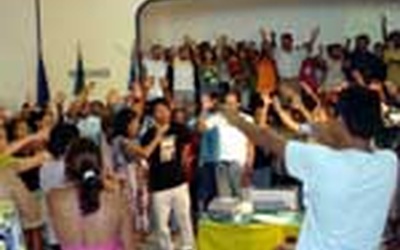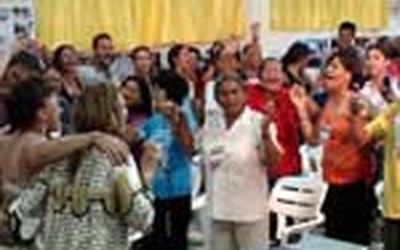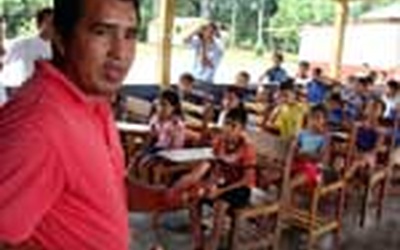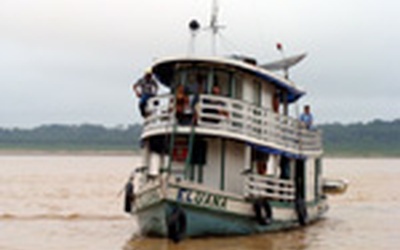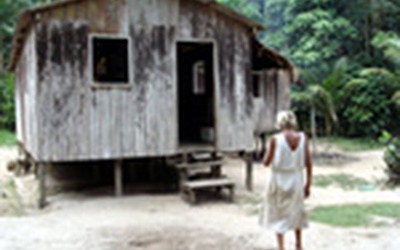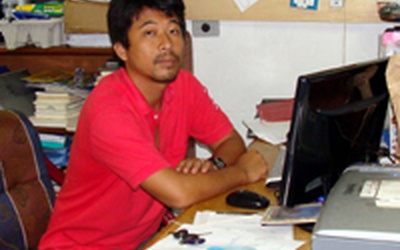Dedicated to improving the lives of the Amazon River people: Japanese people taking on social inequality
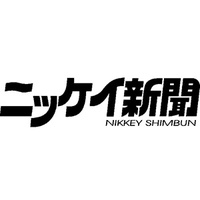
This article is reprinted from Nikkei Shimbun ( www.nikkeyshimbun.com.br ), a Japanese newspaper published in Sao Paulo, Sao Paulo State, Brazil, for Japanese people and expatriates. This is a six-part series on the Japanese community living in the Amazon, reported by Masayuki Fukazawa, editor-in-chief of Nikkei Shimbun.
Stories from this series
第6回・終 森林農業で経済安定へ
Feb. 17, 2009 • Masayuki Fukasawa
>> 第5回住民を〃環境の番人〃にHANDSは今年七月、パラー州のトメ・アスー移住地からアグロ・フロレストリー(森林農業)の日本人専門家を当地に呼び、コミュニティを巡回するセミナーを実施した。地球環境基金(環境再生保全機構)からの助成を受けた。 一見、保健衛生とは関係ないように思えるが、「住民がコミュニティを離れてしまうと自然破壊が進むんです」と定森さんは真剣な表情で訴える。広大 な市ゆえに南部の方ではすでに不法な熱帯雨林の伐採が始まっており、コミュニティが消滅した場所か…
第5回 人間的出産セミナー
Feb. 10, 2009 • Masayuki Fukasawa
>> 第4回日本式助産の知恵を普及「エ・プレシーゾ・サビ・ビビェール!」(生き方を知る必要がある)。全員が立ちあがり、手を叩きながら人間的出産のテーマ曲を合唱する。まるで 自己啓発セミナーか教会のミサのような賑やかさと活気にあふれている。アマゾナス州保健局とJICAの共催だが、堅苦しいセミナーとはほど遠い。 日本式の助産婦の保健知識、妊婦への心理的な支援方法を教える「第二回人間的出産セミナー」が、十月三十~三十一日にマニコレ市立展示場での行われた時の様子だ。 二十八時間…
第4回 電線が文明とのへその緒
Feb. 4, 2009 • Masayuki Fukasawa
>> 第3回毎月船で巡回保健指導に「ボン・ジーア!」。子供たちは好奇心丸出しの表情で一行を迎え、一斉にあいさつする。HANDS職員らが口内の模型を使って、歯ブラシの使い方を教える。 イガラペジーニョ生まれのジョアキン・カバウカンテ・ダ・シルバ校長(31)によれば、ここには五十六家族、三百二人が住んでいる。生徒数は百六人、その大半が集まってきている。 市遠隔地教育局の教師グラージス・シダーデ・テリスさん(38)は、一人芝居のように大げさな動作で「土に落ちている果物は洗って…
第3回 市長が匙を投げる教育
Jan. 29, 2009 • Masayuki Fukasawa
>>第2回巡回授業で保健指導を「こんなに広い面積で州から下りる市予算はわずか。市民の保健、教育を完璧にやることは不可能だ」。再選を決めたばかりのエメルソン・ペドラッサ・デ・フランサ市長は、十月二十九日に共にした昼食で眉をしかめてそう言った。 地元自治体すらお手あげの場所で、教育局と保健局と提携しながら、定森さんは「アマゾン遠隔地学校における健康作りプロジェクト」を〇七年九月から進めている。 今回は第二段階で、第一段階としては「アマゾン地域保険強化プログラム」(〇三年十月…
第2回 陸の孤島マニコレ
Jan. 22, 2009 • Masayuki Fukasawa
>> 第1回遠隔地は半自給自足で週に三便しか飛ばない十八人乗りプロペラ機で一時間ほど行くと、樹海の真っ只中に忽然とマニコレ市が現れた。アマゾナス州都マナウス市から南に三百三十三キロ近く、船なら二晩かかる。もちろん、道路はない。 市といっても面積はオランダ国とほぼ同じ、日本なら九州ぐらいの広さがある。セントロという市街地に二万一千人、マデイラ川沿いの約二百八十のコ ミュニティなどに計二万五千人が住んでいる。計四万六千人の人口だが、州内の六十二自治体の中で六位だというので、実…
第1回 子供を階段から蹴落とす
Jan. 15, 2009 • Masayuki Fukasawa
貧乏旅行でのぞいた現実彼ほど庶民階級のブラジル人に親身になって尽くしてきた人は少ない。定森徹さん(40、千葉県出身)は移民ではない。だが、大学卒業以来、十七年を 伯国で過ごしている変り種だ。聖市ではモンチ・アズールのファベーラ、セアラ州、そして現在はアマゾナス州マニコレ市に住み、JICAブラジル事務所の支 援で、遠隔地住民の生活向上に尽くすプロジェクトを進めている。一貫して庶民の生活向上に関わるボランティア活動を行う定森さんの軌跡を追った。 国際ボランティア活動に足を踏み…

